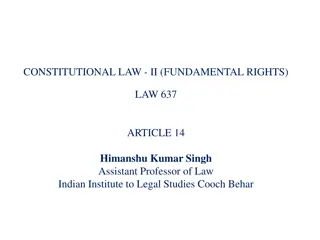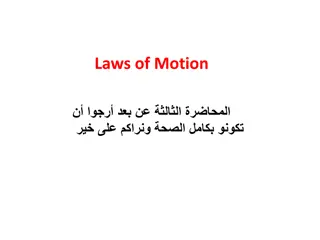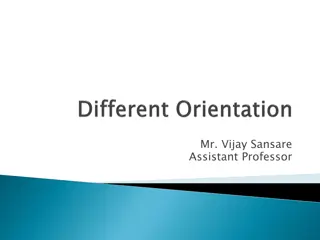Understanding Laws in India: Equality and Evolution
In independent India, all individuals are equal before the law, with laws applying equally to everyone regardless of religion, caste, or gender. The colonial rule brought arbitrary laws like the Sedition Act of 1870, leading to protests for greater equality. With the emergence of the Indian legal profession and the Indian Constitution, laws began to be made by representatives, addressing issues like domestic violence through acts like the Protection of Women from Domestic Violence Act.
Download Presentation

Please find below an Image/Link to download the presentation.
The content on the website is provided AS IS for your information and personal use only. It may not be sold, licensed, or shared on other websites without obtaining consent from the author. Download presentation by click this link. If you encounter any issues during the download, it is possible that the publisher has removed the file from their server.
E N D
Presentation Transcript
CIVICS CHAPTER 4 UNDERSTANDING LAWS MODULE 1/2
Do Laws Apply to All? All persons in independent Indian are equal before the law. The law cannot discriminate between persons on the basis of their religion, caste or gender. All laws apply equally to all citizens of the country and no one can be above the law. Any crime or violation of law has a specific punishment. In ancient India, there were innumerable and overlapping local laws which did not apply equally to all. The punishment for the same crime varied depending upon their caste background with lower castes being more harshly penalized.
Do Laws Apply to All? The British colonialists introduced the rule of law in India. The colonial rule was arbitrary.tc in the use of authority The British law of the Sedition Act of 1870 set a perfect example of the arbitrariness. Under this Act, a person protesting or criticizing the British government could be arrested without due trial. Indian nationalists began protesting and criticizing the arbitrary use of authority by the British. They began fighting for greater equality and wanted to change the idea of law from a set of rules that they were forced to obey, to law as including ideas of justice
Do Laws Apply to All? By the end of 19th century, the Indian legal profession began emerging and demanded respect in colonial courts. Indian judges began to play a greater role in making decisions. With the adoption of the constitution, laws for the country began to the made by the representatives.
When the Indian Constitution came into existence, laws for the country began to be made by our representatives. The Indian Parliament makes laws for the entire country. Whenever, people think that a new law is necessary, they propose for it. The Parliament then comes forward and does what is required. The issue of domestic violence was raised by the people. It was brought to the attention of the Parliament which in due course passed a law The Protection of Women from Domestic Violence Act to uproot this issue. How do new Laws come about How do new Laws come about- -Let us discuss this point in the next Module point in the next Module Let us discuss this























